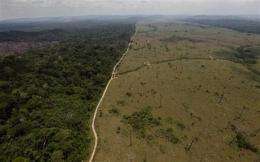As world warms, negotiators give talks another try

(AP) -- The last time the world warmed, 120,000 years ago, the Cancun coastline was swamped by a 7-foot (2.1-meter) rise in sea level in a few decades. A week from now at that Mexican resort, frustrated negotiators will try again to head off a new global deluge.
The disappointment of Copenhagen - the failure of the annual U.N. conference to produce a climate agreement last year in the Danish capital - has raised doubts about whether the long-running, 194-nation talks can ever agree on a legally binding treaty for reining in global warming.
"It's clear after Copenhagen that the U.N. process is `on probation,'" acknowledged Alden Meyer of the Washington-based Union of Concerned Scientists, a veteran observer and supporter of the process.
Even the Mexican hosts of the Nov. 29-Dec. 10 U.N. conference question whether "it is the best way to work - with 194 countries," as Mexico's environment secretary, Juan Rafael Elvira Quesada, put it.
"We must be really open and sincere. Do we need to make an evolution to a new methodology?" Elvira asked in an Associated Press interview.
The core failure has been in finding a consensus formula for mandatory reductions in countries' emissions of carbon dioxide and other global warming gases, byproducts of power plants, other industries, agriculture and automobiles.
For 13 years, the United States has refused to join the rest of the industrialized world in the Kyoto Protocol, a binding pact to curb fossil-fuel emissions by modest amounts. More recently, as China, India and other emerging economies exempted from the 1997 Kyoto pact have sharply increased emissions, they have rejected calls by the U.S. and others to commit by treaty to restraints.
No one expects Cancun to resolve that standoff. Instead, delegates will focus on climate financial aid, deforestation and other secondary "building blocks" to try to revive momentum toward an umbrella deal at next year's conference in South Africa or at the Rio de Janeiro Earth Summit in 2012.
"We expect a positive attitude and a restoration of confidence in the multilateral system at Cancun," said Grenada's U.N. ambassador, Dessima Williams, chair of an alliance of island nations already facing early impacts of climate change.
While the global talks plod along, those impacts seem to be accelerating.
The world's warming oceans, for example, are rising at twice the 20th century's average rate, expanding from the heat and the runoff of melting land ice, says the Geneva-based World Climate Research Program. More ice is melting in Greenland and Antarctica than earlier thought, worried scientists report. Authoritative projections of 2007 - that seas might rise by up to 0.59 meters (1.94 feet) by 2100 - now appear too conservative.
The Yucatan peninsula, where the upcoming talks will take place, once experienced how quickly warming can remake coastlines. Researchers studying fossilized reefs near Cancun report that waters rose at least two meters (6.6 feet) in as little as 50 years during the last "interglacial," or natural warming period between cold, or glacial, ages.
Temperatures then, 120 millennia ago, were only 1 degree Celsius (1.8 degrees Fahrenheit) warmer than today, some 12,000 years into the current interglacial. In their 2007 assessment, the U.N. network of climate scientists projected temperatures will rise this century by up to 6.4 degrees C (11.5 degrees F), depending on whether and how much emissions are rolled back.
The U.N. network - the Nobel Prize-winning Intergovernmental Panel on Climate Change - recommended emissions be cut by 25 to 40 percent below 1990 levels by 2020 to keep temperatures from rising more than 2 degrees C (3.6 F) above preindustrial levels. They already rose 0.7 degrees C (1.3 degrees F) in the 20th century.
In a nonbinding "Copenhagen Accord" from the 2009 conference, industrialized nations pledged reductions of only 18 percent overall, analysts say. The U.S. pledged a 3 percent reduction. China and other developing nations said they would work to rein in emissions growth.
Only a binding treaty with deep reductions can ensure the world will avoid the worst environmental upheavals of climate change, scientists and conservationists say. But the takeover of the U.S. House of Representatives by Republicans, many of whom dismiss strong scientific evidence of human-caused warming, all but rules out U.S. action for at least two years.
Instead, the Cancun negotiators hope at least for agreement on a "green fund" to disburse aid that developed countries promised at Copenhagen - $100 billion a year by 2020 - for developing countries to adapt to a changing climate by building seawalls and shifting farming patterns, for example, and to install clean energy sources.
The developing world hopes, too, for better terms for transferring patented green technology from richer nations. In a third area, delegates aim to make progress on the complex issue of compensating poorer nations for protecting their forests, key to the planet's ability to absorb carbon dioxide.
Parallel to the U.N. talks, often with U.S. leadership, governments have been making limited, voluntary side deals to chip away at emissions. That's "laudable and helpful," Grenada's Williams said, but "we have to go beyond that, to take collective action."
Encroaching seas already are contaminating drinking water and damaging housing in low-lying islands, she said. "It is overwhelming our capacity to stay alive."
More information: U.N. climate talks - http://unfccc.int/2860.php
©2010 The Associated Press. All rights reserved. This material may not be published, broadcast, rewritten or redistributed.

















